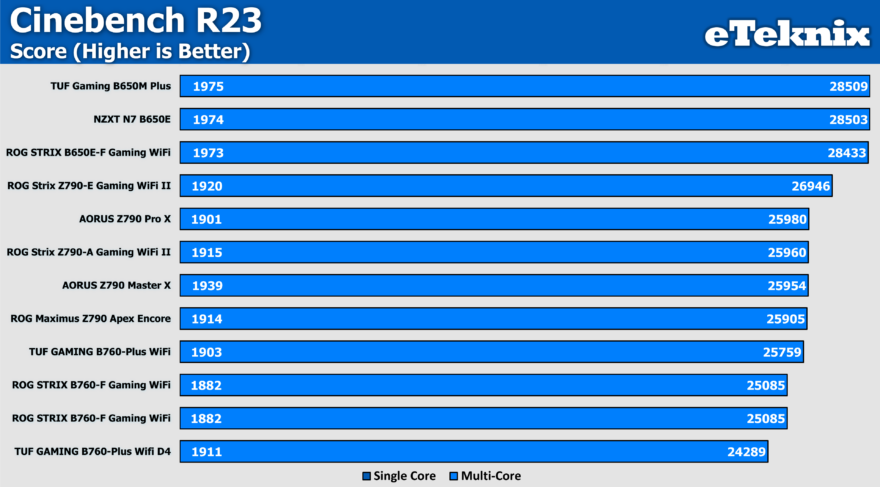ASUS TUF Gaming B760-Plus WiFi D4 Motherboard Review
Peter Donnell / 12 months ago
3DMark Timespy Extreme
3DMark Time Spy Extreme is a Windows benchmark test that uses DirectX 12 to measure the performance of your gaming PC. It consists of two graphics tests and a CPU test that show complex scenes and simulate game physics and logic. It calculates a score for each test and a combined score for the whole test. You can use it to compare your system with others, test its stability and reliability, and optimize it for better gaming performance.
3DMark is available on Steam here.

Despite having a slight handicap with DDR4 memory vs DDR5 the D4 motherboard holds up well here, scoring 8939 points in TimeSpy Extreme.
PCMark 10 Express
PCMark 10 Express is a shorter benchmark that focuses on basic home PC use. It includes the Essentials and Productivity test groups. It is less demanding than the main PCMark 10 benchmark. The Essentials test group covers the common tasks that people do every day with their PCs, such as web browsing, video conferencing, and app start-up time. The Productivity test group measures system performance with everyday office applications, such as writing documents, spreadsheets, and presentations.
Available now on Steam.

It does suffer a little in PCMark10 Express, but again, this is largely down to the use of DDR4 memory and it’s still a pretty competitive score vs the DDR5 boards.
Super PI 2.1 WP
Super PI is a single-threaded benchmark that calculates pi to a specific number of digits. It uses the Gauss-Legendre algorithm and is a Windows port of a program used by Yasumasa Kanada in 1995 to compute pi to 232 digits.
Available now on Super PI.

CPU performance is excellent though, managing our Super Pi run in just 370 seconds, which is one of the faster times on our charts.
Cinebench R23
Cinebench is a real-world cross-platform test suite that evaluates your computer’s hardware capabilities. Improvements to Cinebench Release 23 reflect the overall advancements to CPU and rendering technology in recent years, providing a more accurate measurement of Cinema 4D’s ability to take advantage of multiple CPU cores and modern processor features available to the average user.
Available now on Maxon.

It was the lowest in Cinebench all-core performance, but the single-core score was 1911 which is surprisingly decent.
AIDA64
AIDA64 memory benchmark is a feature of AIDA64, a system information and diagnostics software. It measures the bandwidth and latency of the CPU caches and the system memory by performing various read, write, copy, and latency tests. It uses different instruction set extensions and optimizations depending on the processor and memory type. It also supports multi-threading, multi-processor, and multi-core systems. You can use it to compare your system performance with others, test its stability and reliability, and optimize it for better performance.
Available now on AIDA64.




Obviously, the DDR4 memory ran slower than all the other boards that use DDR5, that’s hardly shocking, but its performance is right on track with our expectations. What is good to see is that the board has the lowest memory latency, which is certainly a benefit for latency-critical applications.



















